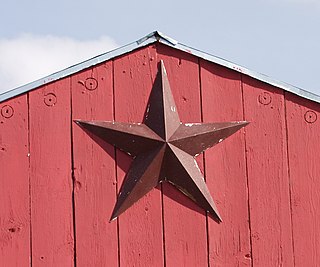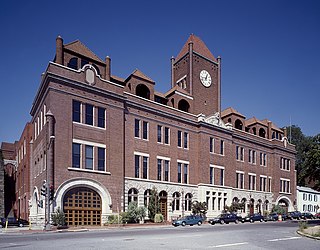When a person assumes the family name of their spouse, that name replaces the person's birth surname, which in the case of the wife is called the maiden name, whereas a married name is a family name or surname adopted by a person upon marriage.

The barn swallow is the most widespread species of swallow in the world. It is a distinctive passerine bird with blue upperparts and a long, deeply forked tail. It is found in Europe, Asia, Africa and the Americas. In Anglophone Europe it is just called the swallow; in Northern Europe it is the only common species called a "swallow" rather than a "martin".

A barn is an agricultural building usually on farms and used for various purposes. In the North American area, a barn refers to structures that house livestock, including cattle and horses, as well as equipment and fodder, and often grain. As a result, the term barn is often qualified e.g. tobacco barn, dairy barn, sheep barn, potato barn. In the British Isles, the term barn is restricted mainly to storage structures for unthreshed cereals and fodder, the terms byre or shippon being applied to cow shelters, whereas horses are kept in buildings known as stables. On the Continent, however, barns were often part of integrated structures known as byre-dwellings. In addition, barns may be used for equipment storage, as a covered workplace, and for activities such as threshing.

The barn owl is the most widely distributed species of owl and one of the most widespread of all birds. It is also referred to as the common barn owl, to distinguish it from other species in its family, Tytonidae, which forms one of the two main lineages of living owls, the other being the typical owls (Strigidae). The barn owl is found almost everywhere in the world except polar and desert regions, in Asia north of the Himalayas, most of Indonesia, and some Pacific islands.
Lists of most common surnames by region:
In several cultures, a middle name is a portion of a personal name that is written between the person's given name and their surname. A person may be given a middle name regardless of whether it's necessary to distinguish them from other people with the same given name and surname. In cultures where a given name is expected to precede the surname, additional names are likely to be placed after the given name and before the surname, and thus called middle names. In English-speaking American culture, that term is often applied to names occupying that position even if the bearer would insist that that name is being mistakenly called a "middle name", and is actually :

A barnstar is a painted object or image, often in the shape of a five-pointed star but occasionally in a circular "wagon wheel" style, used to decorate a barn in some parts of the United States, and many rural homes in Canada. They have no structural purpose but may be considered lucky, akin to a horseshoe mounted over a doorway. They are especially common in Pennsylvania and frequently seen in German-American farming communities.
Spanish naming customs are historical traditions for naming children practised in Spain. According to these customs, a person's name consists of a given name followed by two family names (surnames). The first surname is usually the father's first surname, and the second the mother's first surname. In recent years, the order of the surnames can be decided at birth. Often, the practice is to use one given name and the first surname only, being used in legal, formal, and documentary matters, except when the first surname is very common. In these cases, it is common to use only the second surname, as in “Lorca”, "Picasso" or “Zapatero”. This does not affect alphabetization: discussions of "Lorca", the Spanish poet, must be alphabetized in an index under “García Lorca", never "Lorca".

The Red Barn restaurant was a fast-food restaurant chain founded in 1961 in Springfield, Ohio, by Don Six, Martin Levine, and Jim Kirst. In 1963, the small chain was purchased by Richard O. Kearns, operated as Red Barn System, with the offices moving briefly to Dayton, Ohio and in August 1964 to Fort Lauderdale, Florida. During the late 1960s United Servomation, also called Servomation, bought the Red Barn chain. In 1978 United Servomation merged with the City Investing Company's GDV division which also owned the Motel 6 motel chain. Only interested in real estate, construction, and financial services the new owners ceased advertising for the chain along with allowing the franchise leases to expire with the last of the leases expiring around 1988. At its peak, Red Barn had 300–400 restaurants in 19 states, as well as outlets in southern Ontario, elsewhere in Canada, and Australia.
In the Philippines, varying naming customs are observed, whether it is given name first, family name last, a mixture of native conventions with those of neighbouring territories, etc. The most common iteration amongst Filipinos is a blend of the older Spanish system and Anglo-American conventions, where there is a distinction between the "Christian name" from "surname". The construct of having several names in the middle name convention is common to all systems, but to have multiple "first" names and only one middle and last name is a result of the blending of American and Spanish naming customs. The Tagalog language is one of the few national languages in Asia to use the Western name order while formally uses the eastern name order. Thus, the Philippine naming custom is coincidentally identical to the Spanish and Portuguese name customs and to an extent Chinese naming customs.
A Portuguese name is typically composed of one or two given names, and a number of family names. The first additional names are usually the mother's family surname(s) and the father's family surname(s). For practicality, usually only the last surname is used in formal greetings.

Dutch barn is the name given to markedly different types of barns in the United States and Canada, and in the United Kingdom. In the United States, Dutch barns represent the oldest and rarest types of barns. There are relatively few—probably fewer than 600—of these barns still intact. Common features of these barns include a core structure composed of a steep gabled roof, supported by purlin plates and anchor beam posts, the floor and stone piers below. Little of the weight is supported by the curtain wall, which could be removed without affecting the stability of the structure. Large beams of pine or oak bridge the center aisle for animals to provide room for threshing. Entry was through paired doors on the gable ends with a pent roof over them, and smaller animal doors at the corners of the same elevations. The Dutch Barn has a square profile, unlike the more rectangular English or German barns. In the United Kingdom a structure called a Dutch barn is a relatively recent agricultural development meant specifically for hay and straw storage; most examples were built from the 19th century. British Dutch barns represent a type of pole barn in common use today. Design styles range from fixed roof to adjustable roof; some Dutch barns have honeycombed brick walls, which provide ventilation and are decorative as well. Still other British Dutch barns may be found with no walls at all, much like American pole barns.

Bousies is a commune in the Nord department in northern France.
Garver is a surname. Notable people with the surname include:
Verschuur is a Dutch toponymic surname. The name is a contraction of van der schuur, meaning "from the barn". Some variant forms are Verschueren, Verschuren and Verschuuren. Notable people with the surname include:
Barn house, Barnhouse or Barn House may refer to:

The Georgetown Car Barn is a historic building in the Georgetown neighborhood of Washington, D.C., in the United States. Designed by the architect Waddy Butler Wood, it was built between 1895 and 1897 by the Capital Traction Company as a union terminal for several Washington and Virginia streetcar lines. The adjacent Exorcist steps, later named after their appearance in William Friedkin's 1973 horror film The Exorcist, were built during the initial construction to connect M Street with Prospect Street.








